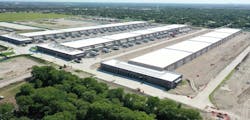Compass Datacenters Unites with Schneider Electric for Prefab Modular Integration
Compass Datacenters this week announced its formation of a key supply chain integration partnership with Schneider Electric. The collaboration hinges on the construction and operation of a new Schneider Electric integration facility, currently being built adjacent to Compass Datacenters' campus in Red Oak, Texas.
The companies said the new 110,000 SF integration facility will scale up production capabilities for modular data center platform technologies, dramatically reducing the time from ordering to deployment across the U.S.
Scheduled to open by April of 2024, the new plant will support increasing industry demand for prefabricated modular data centers.
Prefab modular benefits
The idea of employing modular data centers as a strategy to future-proof facilities is one that has only gained momentum in recent years, alongside the rate of disruption, data surge cycles, digital transformation, and overall demand in the data center industry.
Indeed nowadays, as noted by DCF contributor Bill Kleyman in a recent article series charting the progression of data center design trends from legacy to modern:
"Some are revolutionizing data center architecture by prefabricating upwards of 70% of their facilities in factories. They’re seeing this evolution as a digital infrastructure-as-an-assembly line. Furthermore, the rapidly evolving competitiveness in the global market and advanced technologies have made it simpler and cheaper for enterprises to shift their workload to self-contained data centers. However, with massive growth come growing pains. Challenges include demand vastly outstripping supply, legacy construction and deployment practices, and supply chain issues."
Focused on local production of technology with a widespread impact, the new integration facility in Red Oak is being designed to integrate modular data center platforms by building pre-engineered, prefabricated IT infrastructure that will be delivered to Compass, as well as Schneider’s customers across the U.S.
“This first-of-its-kind industry collaboration reflects the changing dynamics of data center supply chains and the competitive need for more tightly integrated vendor/supplier partnerships,” noted Chris Crosby, CEO of Compass Datacenters. "The integration facility will assemble and deliver power centers for Compass facilities and will enhance our supply chain reliability, speed to market and delivery schedule integrity."
Schneider Electric expects to streamline this process by accelerating production via its optimized supply network, the better to eliminate up-front engineering and design work on the way to delivering quality finished solutions.
“We are industry leaders because our manufacturing and integration facilities provide the space, technology, and agility to enhance production velocity while nurturing novel business models, such as this partnership with Compass,” said Aamir Paul, North America President, Schneider Electric. “This modern approach we’re pursuing supports both organizations’ goals and serves as a guidepost for vendor and industry partnerships others can follow.”
Project scale and scope
In an interview with DCF, Nancy Novak, Chief Innovation Officer of Compass Datacenters, and Phanney Kim Brevard, Head of Strategy and Business Transformation for Schneider Electric's Data Center Systems and Secure Power businesses, provided an on-the-ground update for the scale and scope of the new integration facility, its construction, and the companies' unique partnership.
Novak said the construction project was starting foundations this week pending release of a permit. "We’ve already cleared and grubbed the site. The surveys are done, and the bids are in - we’re reviewing those right now," she said. "The city has been very involved; it’s been a good relationship with Red Oak. We should be rocking and rolling here in the next week or so."
The companies emphasized that the innovative partnership model embodied by the Red Oak integration facility will extend the advantages of speed and cost savings, serving customers in industries and segments ranging from cloud and service providers to the healthcare, education, telecommunication, and mining industries.
Of the site's construction, Novak added, "This is a tilt-up structure, because of speed, because we wanted to get it off the ground fast, and because of capacity on pre-cast. Initially we thought pre-cast, but tilt-up was faster."
Recent findings by McKinsey as cited by Schneider Electric and Compass indicate that companies that regularly collaborated with suppliers demonstrated higher growth, lower operating costs, and greater profitability than their industry peers.
However, despite such improved efficiencies, the McKinsey data also indicates that many businesses struggled to integrate the approach into their overall procurement and supply-chain strategies, demonstrating the growing need for such new partnership models as the one on display in Red Oak.
Novak observed, "With the partnership we’ve had with Schneider, this is going to put us in a really good position to be able to meet all of our commitments and obligations to our clients, and make sure that we have a very predictable cadence of being able to do that with these items that are long-lead. That’s really the whole thing - how do you solve for that? Well, this is one way you solve for it, and I think we’re the first ones to do it."
UPS testing facility enhances prefab benefits
Schneider's Brevard explained that the new facility will predominantly handle integration of several technologies, including prefabricated modular data systems, power modules, power centers, all-in-ones and data halls.
"That’s a result of the extreme demand that we’ve been seeing over the past 12 to 24 months," she said.
Novak remarked that the addition of a UPS testing facility to the integration site's design may have caused some slight delay in planning, but was a key requirement. Brevard agreed, citing rising industry demand for backup power and power supplies.
"The UPS testing facility is just a great feature to have when you’re considering the amount of demand that we’re seeing both at the component level, as well as from a prefabricated level," Brevard said. "Having this new facility with modern technologies, more connected products, and the ability to test some of the really critical components like a UPS, this is basically Schneider’s way of constantly investing and ensuring that we do whatever we can to be able to anticipate the evolutions in the market."
As further noted by Novak, "We were just at a prefab conference this year, and Compass actually won the prefab contractor of the year, because 70 percent of our facilities are done offsite. That’s really important to us, and I’ve seen that conference grow from a few hundred to over a thousand in a very short period of time."
Novak continued, "It’s becoming not just normal, but needed in the industry, which is a really good thing, because there’s so many benefits to having offsite manufacturing, advanced work packaging, and prefabrication. That includes benefits like the talent pool, doing more with less, being safer, more sustainable, better quality - all of those things."
Workforce and future-proofing cornerstones
The state-of-the-art facility is expected to create over 100 jobs in Red Oak, enabling both companies to integrate their supply chain networks in response to data center business growth and customer demands, while enhancing both product availability and delivery.
According to Brevard, "We’re looking at anywhere from between 100 to 200 [jobs] - 100 is the minimum, given the type of volume we’re anticipating over the next 12 to 24-36 months."
She added, "This is a traditional Schneider Electric facility that’s operated by Schneider. Right now the priority is being able to deliver what Compass needs. Compass is the great powerhouse in building the site for us, but we will manufacture for all of our end customers there."
According to Novak, future-proofing and being able to continuously improve has been one of the cornerstones of the relationship between Compass and Schneider.
"Staying on that cutting edge, if there’s different products that are more superior, whether for sustainability or longevity or for total cost of ownership, or anything we can do to try to help our ops teams versus our delivery teams - that’s super-critical for us," said Novak. "Because as we do these prefabricated units, we have to be able to have them be deployed anywhere in our portfolio, and being able to plug and play as new technologies come about is also very critical."
"We are also making a significant investment into this facility for the very reason of future-proofing," agreed Brevard.
She continued, "This is very much strategic for Schneider Electric: being able to not only have the flexibility and the agility from the size of this location, but where it’s centrally located, being in Red Oak, it opens up both talent, job opportunities, and more importantly, it gives us an ability to stay ahead of the game by being able to work with leading innovators like Compass to determine what that next generation of modular data centers is going to look like."
Brevard concluded, "We’ve got executive sponsorship behind this and, quite frankly, everybody’s just waiting for this thing to open, like tomorrow. But we’ll have to wait till April which, quite frankly, is still pretty aggressive. But we’ve got Nancy behind us, so I’m confident it’ll be there in April 2024."
AI amplifying supply chain pressure
In assessing the state of the data center supply chain in 2023, participants in a recent DCF Executive Roundtable reached some consensus that many elements of the supply chain have stabilized, while noting that delays and pricing issues including extended lead times and supplier backlogs still persist for some equipment.
However, as recently as this Spring, DCF reported that data center pricing continues to rise as supply chain issues slow new development, with constraints on availability of space and power contributing to increased prices and lack of availability.
Compass Datacenters and Schneider Electric say the Red Oak integratrion facility is intended to alleviate many such supply chain concerns.
Novak stated, "We’re looking at this as a gamechanger for us, because of the pipeline of obligation we have right now. We think that the location is very strategic and ideal. Based on the supply chain and the way in which things get logistically delivered, this is a really wonderful spot for us to assemble everything and be able to deploy as needed."
She added, "Right now, you almost can’t get enough in the supply chain. Supply chain, across the board, is the new norm - it’s a lot of demand. We don’t see anything slimming down in the near future for a variety of reasons."
Novak concluded, "Honestly, it’s because of the tidal wave of A.I. that has come on. That’s just made it even more so. It’s amplified the need, on top of the other perfect storm of things that's happening in the industry. "
About the Author
Matt Vincent
A B2B technology journalist and editor with more than two decades of experience, Matt Vincent is Editor in Chief of Data Center Frontier.



